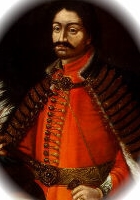Bálint Balassi
Bálint Balassi Poems
Bálint Balassi Biography
Baron Bálint Balassi de Kékkő et Gyarmat (Hungarian: Gyarmati és kékkői báró Balassi Bálint, Slovak: Valentín Balaša; 20 October 1554 – 30 May 1594) was a Hungarian Renaissance lyric poet. He wrote mostly in Hungarian, but was also proficient in further eight languages: Latin, Italian, German, Polish, Turkish, Slovak, Croatian and Romanian. He is the founder of modern Hungarian lyric and erotic poetry. Balassi was born at Zólyom in the Kingdom of Hungary (today Zvolen, Slovakia). He was educated by the reformer Péter Bornemissza and by his mother, the highly gifted Protestant zealot, Anna Sulyok. His first work was a translation of Michael Bock's Wurlzgertlein für die krancken Seelen, (published in Kraków), to comfort his father while in Polish exile. On his father's rehabilitation, Bálint accompanied him to court, and was also present at the coronation diet in Pressburg (today's Bratislava), capital of Royal Hungary in 1572. He then joined the army and fought the Turks as an officer in the fortress of Eger in North-Eastern Hungary. Here he fell violently in love with Anna Losonczi, the daughter of the captain of Temesvár, and evidently, from his verses, his love was not unrequited. But after the death of her first husband she gave her hand to Kristóf Ungnád. Naturally Balassi only began to realize how much he loved Anna when he had lost her. He pursued her with gifts and verses, but she remained true to her pique and to her marriage vows, and he could only enshrine her memory in immortal verse. In 1574 Bálint was sent to the camp of Gáspár Bekes to assist him against Stephen Báthory; but his troops were encountered and scattered on the way there, and he himself was wounded and taken prisoner. His not very rigorous captivity lasted for two years, during which he accompanied Báthory where the latter was crowned as King of Poland. He returned to Hungary soon after the death of his father, János Balassi. In 1584 married his cousin, Krisztina Dobó, the daughter of the valiant commandant, István Dobó of Eger. This became the cause of many of his subsequent misfortunes. His wife's greedy relatives nearly ruined him by legal processes, and when in 1586 he turned Catholic to escape their persecutions they slandered him that he and his son had embraced Islam. His desertion of his wife and legal troubles were followed by some years of uncertainty, but in 1589 he was invited to Poland to serve there in the impending war with Turkey. This did not take place and after a spell in the Jesuit College of Braunsberg, Balassi, somewhat disappointed, returned to Hungary in 1591. In the 15 years war he joined the Army, and died at the siege of Esztergom-Víziváros the same year as the result of a severe leg wound caused by a cannonball. He is buried in Hybe in today's Slovakia. Balassi's poems fall into four divisions: hymns, patriotic and martial songs, original love poems, and adaptations from the Latin and German. They are all most original, exceedingly objective and so excellent in point of style that it is difficult even to imagine him a contemporary of Sebestyén Tinódi Lantos and Péter Ilosvay. But his erotics are his best productions. They circulated in manuscript for generations and were never printed until 1874, when Farkas Deák discovered a perfect copy of them in the Radványi library. For beauty, feeling and transporting passion. there is nothing like them in Magyar literature until we come to the age of Mihály Csokonai Vitéz and Sándor Petőfi. Balassi was also the inventor of the strophe which goes by his name. It consists of nine lines a b c c b d d b, or three rhyming pairs alternating with the rhyming third, sixth and ninth lines.)
The Best Poem Of Bálint Balassi
Grant me tranquillity
Grant me tranquillity,
calm impassivity,
heavenly Lord!
Guard my poor sanity,
my heart in captivity
put to the sword!
Through long years of penitence
my spirit craved sustenance,
desiring salvation;
shield me and watch with me,
let not your enmity
cause my damnation.
Not without labour
you saved me, my saviour,
through death of your son.
For his sake assist me
that you might complete
what you had begun.
Your mercies so mighty,
not my sins unsightly
should precedence have.
Your grace is eternal
though my sins infernal
cry out for the grave.
Can you in beatitude
suffer vicissitude
or loss of possession?
Can you awaken
the ranks of forsaken
by thy intercession?
Why should I doubt,
when despair is cast out
in trust of your word;
freely you'll grant me
the grace not denied me,
the faithful's reward.
Lord, do not resist me,
unclench your great fist,
be tender and kind,
forgive my beginnings
and heal the torn wings
of pitiful mind.
Flying, I'd bless you,
adoring address you,
my trespass defying,
thus practiced in flight,
my soul being healed might
I rise in my dying.
